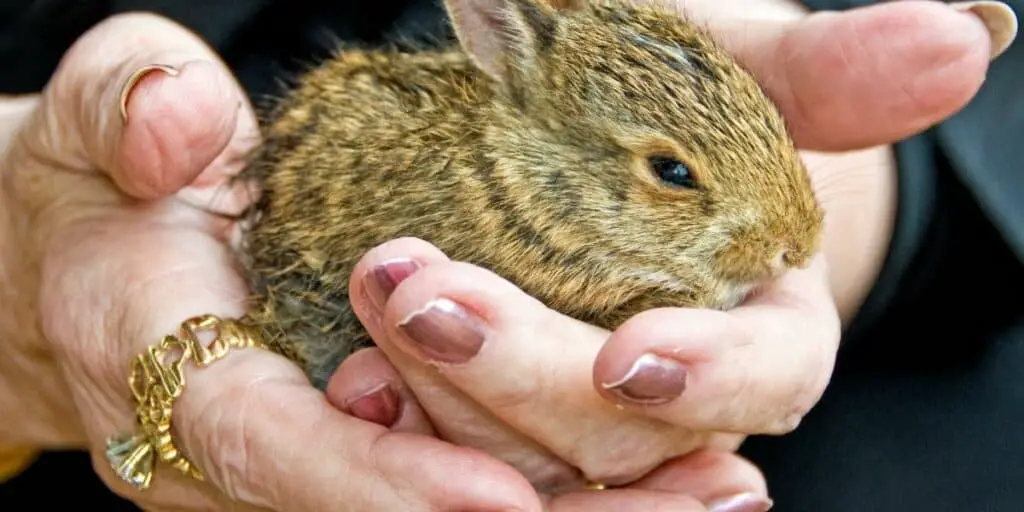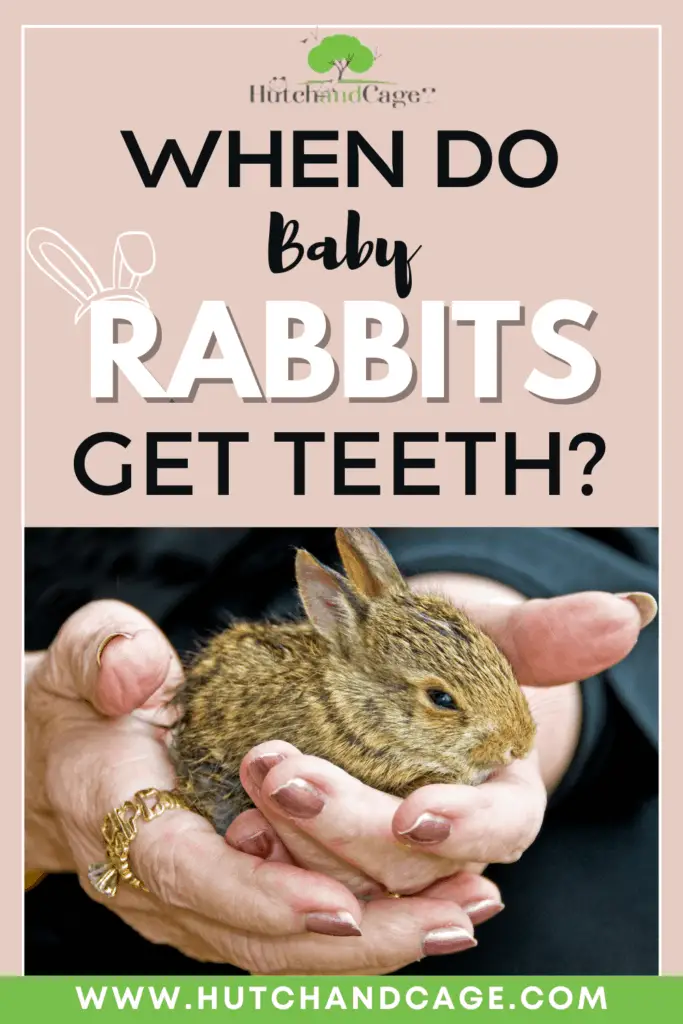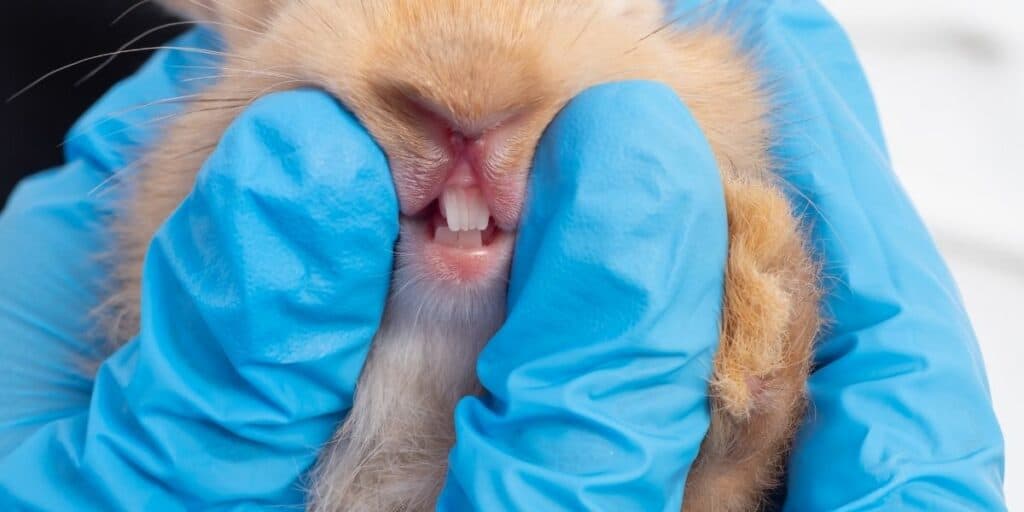If you are wondering when do baby rabbits get teeth, you won’t have to wait long at all. Though these incredibly cute kittens are born without teeth, most will have grown them within two to three weeks after birth (19 to 21 days).
It’s exciting to handle and look after babby rabbits. They are incredibly cute, soft, and lovely to gently cup in your hands. Baby bunnies need lots of TLC and diet and dental care are a big part of keeping their tooth development on track. Read on for a handy guide covering all the essentials for keeping a young rabbit’s teeth healthy.
Table of Contents
Bunny teeth come in two sets just like us!
Did you know that those new baby rabbit teeth are only standing in for the main event? Like humans, rabbits are diphyodonts. This means that they have two successive sets of teeth.
Those little baby rabbit teeth you are looking out for are known as deciduous teeth that eventually will fall out and be replaced by a strong, durable and permanent set after a few months.
Once the permanent set is in place, any damage or tooth loss will not be replaced, making it all the more important that this set is well taken care of.
How many teeth is a baby rabbit going to get?
Those pearlescent baby rabbit nibblers are also fewer in number than the permanent set. Expect your baby bunnies to grow a set of 16 deciduous teeth, that will be replaced by 28 permanent teeth.

What types of teeth do rabbits have?
You are probably familiar with the Bugs Bunny paired incisors that rabbits have in the front of their mouth, but they also have other key types of teeth.
Their cheek teeth are the real workhorses of the rabbit as they will be continually grinding down the plant matter the rabbit needs for nutrition.
The cheek teeth are premolars and molars and rabbits also have additional pairs of incisors on the upper and lower jaws.
Looking after your baby rabbit’s first teeth
If you are looking after a very young rabbit, caring for the deciduous teeth provides a great opportunity to establish good tooth care habits and routines to last your pet rabbit’s whole life.
Rabbits have aradicular hypsodont teeth. That mouthful means that the rabbit’s teeth will grow continuously and is also known as elodont dentition.

Do not underestimate the capacity of a rabbit’s teeth to grow and grow and grow! This will go on throughout the life of your pet and needs to be curbed by a diet that keeps tooth growth under control.
Feeding a baby rabbit
Baby rabbits should be kept with their mother for at least the first 8 weeks of life. During this time, even after the emergence of the first teeth, they will be drinking mother’s milk.
Once the teeth have erupted (2 to 3 weeks), they will start copying mom by nibbling on some of the nesting hay. This is more imitation than a serious transition to eating.
Within the first month of life, the kittens will be eating food just like mom (plus milk). Many owners provide nutritionally balance pellets and then gradually introduce hay.
The baby teeth will now be competently completing the work of grinding down the vegetation provided for food with weaning possible from around the two-month stage.
Expect baby rabbit teething
You may find the kittens chewing on parts of the cage or clicking or grinding their new teeth. This is not a major concern and will pass once all the teeth have erupted. Providing your baby rabbits something to chew on like a salt or mineral lick, or piece of wood.

Once a full diet is established, provide a high fiber diet that can stop tooth overgrowth.
A pellet diet will not be able to content with the rate of growth of a rabbit’s teeth (peg incisors grow at a rate of 2 to 2.4 millimeters per week), so a key part of weaning is to establish your fur babies on a high fiber diet.
The pellets need to be reduced with the supportive introduction of the hay that can provide suitable wear for the teeth. By 6 to 7 months of age, these little nibblers should be eating the grass hay they require as a staple.
Chewing toys made from wood or cellulose are also helpful for keeping the rabbit’s teeth in great condition.
Keep an eye out for teeth problems.
Young rabbits should be watched carefully for the emergence of dental problems which need to be tackled early. Any problems with a rabbit’s teeth will have the knock-on effect of affecting the rabbit’s ability to eat.
This can cause rapid deterioration of the health of a young rapid. Dental problems encountered in rabbits include:
- Mandibular prognathism is an abnormal protrusion of the lower jaw which impairs the occlusion of the teeth.
- Overgrowth of incisors/molars is predominantly caused by an inappropriate (low-fiber) diet. Protruding teeth will prevent normal eating and drinking.
- Trauma to the teeth can break them or lead to incorrect positioning and alignment
- Long sharp irregular teeth can cause lesions and abscesses.
- Caries (tooth decay) can also affect rabbits. It is often precipitated by a diet that is high in fruit and vegetables.
Rounding up
The development of new teeth is a significant milestone for baby rabbits and an exciting one for owners!
The early weeks of life have many transitions and when it comes to long-term dental health establishing your kittens on that high fiber diet is critical.
Remember to observe your young rabbit closely and reach out to your vet early on if dental problems arise.




